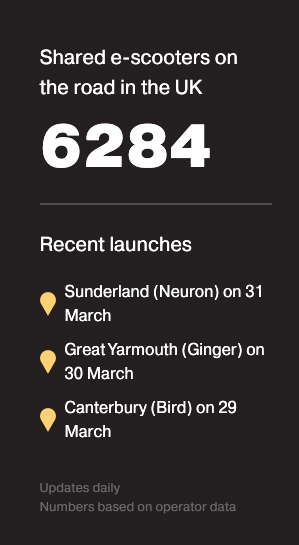Today is the Department for Transport’s (DfT) own deadline for all shared e-scooter trials to start in the UK.
However, there are still many questions that need to be answered, including whether there will be an extension. Zag thinks it’s likely.
Stay tuned for an official announcement soon as the DfT told us “more information will be available in due course”.
In the meantime, Zag has crunched some figures to provide a snapshot of how successful some of the e-scooter trials have been so far.
Zag’s data gives a first indication of the UK’s busiest shared e-scooter hotspots.
There is also now a tracker on the Zag homepage that is updated daily to show the number of shared e-scooters currently on the roads in the UK.
The next big milestone will be 10,000 and it’s possible that figure will be reached soon due to plans to ramp up the size of the fleets this spring. Keep checking back to catch up on progress.
While shared e-scooter fleet growth is giving people more options, the industry knows it needs to link with existing transport networks to help more people ditch their car.
If micromobility is to truly play a role in decarbonising transport, there has to be proper fixed term infrastructure in place to link public transit with cleaner alternatives for onward journeys like e-scooters and e-bikes.
Zag has taken a look at the how Europe-wide pilot project eHUBS is aiming to bring a menu of micromobility to tempt people with more sustainable transport options.
1. Superpedestrian gears up for European expansion
What: US-based Superpedestrian is ready to start ramping up its expansion plans to launch in 20 new cities in Europe before the end of August. The company has also started to roll out updates “over the air” to its global fleet to extend battery range and more.
Why it matters: This is another example of the pace of expansion for shared e-scooter mobility across Europe and follows on from rival Bird investing over £100m earlier this month. Superpedestrian may have missed out on the UK trials but is showing it wants to compete in what is already becoming a crowded market.
2. Universal infrastructure
What: Paris is launching a pilot to put 150 fixed micromobility charging hubs in place that will work with any e-scooter or e-bike.
Why it matters: Proper infrastructure to link public transport with micromobility will be vital to reduce car trips as the automatic choice for onward journeys. Having a fixed universal solution sends a signal to passengers and riders that micromobility options are here to stay. Will London follow in Paris’ footsteps and put its own pilot in place?
3. Wind’s top five lessons from Italy
What: Wind has shared some of the biggest lessons learnt from its largest European market – Italy.
Why it matters: Wind is currently running one of the top 10 largest UK trials in the Nottingham/Derby area in the UK. These lessons on safety, compliance, technology and collaboration show how some of the operators with experience running larger fleets across Europe can share knowledge for new launch markets.

